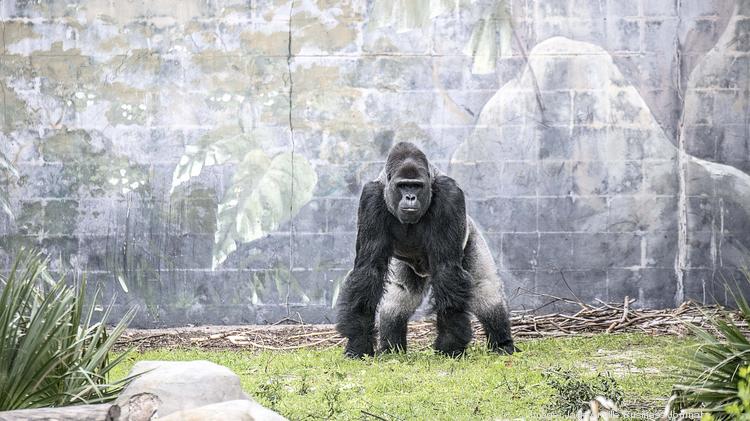The Jacksonville Zoo’s African Forest build-out continues to make headway with the addition of support structures, walls and a spread of roots for the central tree.
It’s the one-of-a-kind central tree that is the crux of the project. Each of the ape exhibits in the African Forest will connect to the 42-foot-tall tree via overhead trails similar to the ones in the Land of the Tiger exhibit. The tree structure features an internal spiral staircase that will allow keepers to interact and provide enrichment for the apes in the mesh-enclosed “exhibit.” It will even have an enrichment station that will allow the apes to interact with a touch-screen app.
The African Forest, a $9 million, four-acre project, incorporates “wellness-inspired design” and will replace the former Great Apes Loop which opened in 1998. The renovation was largely spurred by the groundbreaking Range of the Jaguar exhibit in 2004 and Land of the Tiger in 2014, both of which won national awards for innovation and quality design.
At the end of January, the African Forest project sat funded to $7.3 million out of its $9 million price tag. Now, just $400,000 is left to be raised.
“When we had the zoo folks [from January’s ZACC conference] here, they were amazed at what we have been able to do with so little money,” said construction project manager Cullen Richart.
The Land of the Tiger exhibit alone cost $9.5 million, according to previous reporting. Range of the Jaguar cost $14.4 million.
Jacksonville Zoo Primate Update
The Jacksonville Business Journal got a behind the scenes update on the Jacksonville Zoo's new primate habitat. The centerpiece of the area will be a man made canopied tree that primates will be able to access and climb. There will even be an iPad for them to use, a practice that other zoos have… more

VIEW SLIDESHOW
9 photos






The new great apes loop will feature a new entry way, bonobo building, gorilla enclosure and lemur exhibit. Every concrete wall is being sculpted to resemble rock; every concrete beam is being sculpted to resemble wood branches stemming from the central tree. The bonobo building will feature a “bio-floor” that has never been implemented in a Florida zoo, and the central trees structure is one of a kind.
The biggest reason to change the exhibit, Richart said, is to better the environment for the wellness of the animals.
“With the trails, we can get out as many animal groups as possible, and with the bonobo enclosure having a canopy, they can be out at night,” Richart said, grinning. “They can see the stars. They’ve never been able to see the stars before.”
The construction of the project sees its own unique challenges, as cleaning systems must be installed and structures built strong enough to contain gorillas.
Rock climbers from the Edge Rock Gym in Jacksonville have visited the African Forest twice to test if gorillas would be able to scale the walls to escape the enclosure. The climbers have managed to get out both times, which means the rocky walls need to be adjusted so the gorillas can’t find handholds to climb out.
Some pieces of the exhibit, such as the trail structures and netting, are being constructed in Ohio. As long as those pieces arrive on time, the project should finish on time, said zoo director Tony Vecchio.
“Some of these key pieces are out of our hands,” Vecchio said, “but we should be open for Labor Day weekend.”
https://www.bizjournals.com/jacksonville/news/2018/04/22/jacksonville-zoo-african-forest-construction.html